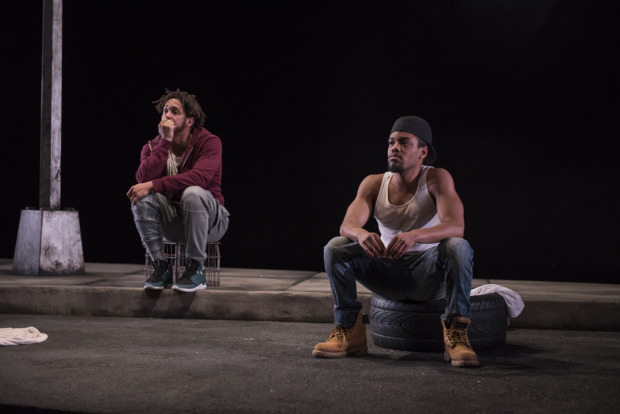Pass Over

(© Michael Brosilow)
Waiting for Godot, Samuel Beckett's 1953 absurdist masterpiece, has been called the "most significant English language play of the 20th century." It is studied by students of theater and philosophy, spoofed by everybody from Sesame Street to Stephen Colbert, and frequently produced all over the world. Antoinette Nwandu's Pass Over, receiving its world premiere at Steppenwolf's upstairs theater, uses Beckett's timeless play as a jumping-off point for a new vital work, one that is simultaneously more absurd and more desperately real than its inspiration.
Kitch (Julian Parker) and Moses (Jon Michael Hill), two black men, live on the streets. They take shifts sleeping under a lamppost. The restless Moses dreams and plans for the day that they'll "pass over," join society and leave the block behind. Kitch is less ambitious, happy to let Moses make the decisions for the both of them.
In small throwaway lines, details of their surreal reality emerge. Where Vladimir and Estragon, their absurdist counterparts from Godot, are held back only by their own shiftlessness and ennui, Moses and Kitch are actually trapped on the block, forcibly contained by a mysterious authoritarian presence. Whenever they so much as attempt to pass over, the lights crash down to black and bullets ring out; an effect that hits like a punch to the gut, courtesy of lighting designer Marcus Doshi and sound designer Ray Nardelli.
When the block is breached by a seemingly clueless white man in a clean linen suit (Ryan Hallanan), Moses and Kitsh are immediately on guard. With an old-fashioned vernacular and a picnic basket full of treats, the visitor, known as Mister (or, occasionally, Master) is Little Red Riding Hood and the Wolf wrapped up in one. He gives Moses and Kitch's justifiable paranoia a human face, and despite his insistence that he's simply lost and tired, there's something more sinister under the surface.
Nwandu's script pulls no punches. Moses and Kitsch pass the time in repetitive, idle conversation, but more often than not, their conversation turns to violence. Kitsch, who is fond of lists, tries to name all the people they know who've been killed: Moses's brother, Kitsch's mother, their friend Andre ("Which Andre?" Moses interrupts. "Both," Kitsch responds), and many others. Death isn't some abstract specter for the men of Pass Over, it's a part their everyday life.
Hill and Parker give equally excellent performances. Directed by Danya Taymor, they slip effortlessly between broad comedy and deadly serious struggles. Hallahan makes an excellent foil, double-cast as Mister and the more serious Ossifer, who appears in the second half of the play. Wilson Chin has designed a distinctive, arrestingly simple set: a lamppost, a toppled water fountain and a jagged, filthy stretch of street that serves as a strong canvas for this abstract work.
Performed in Chicago's wealthy Lincoln Park neighborhood, this could all come off as exploitative, but it doesn't. There are moments, especially in the latter half of the play, that move precariously close to being gratuitous, but the conviction of Parker and Hill's performances and Nwandu's electric language keep Pass Over on solid ground. Seeing this urgent, poetic new play should be a priority for Chicago audiences.











